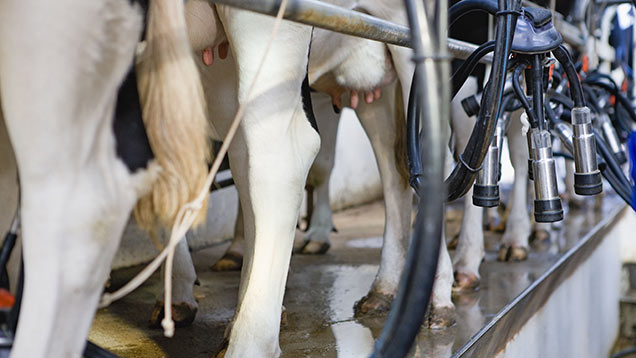7 steps to help dairy farms thrive in a volatile world
 ©Juice/Rex
©Juice/Rex There is little dairy farmers can do about rock-bottom milk prices. But they can make changes now that will pay off in the long run. Promar International managing director James Dunn sets out the key steps to build a durable dairy business in a volatile world.
1. Get planning
Dairy farmers can adopt a long-term plan for their business. That might be three years, five years or seven years.
The important part is setting down business goals you can target. It can include an overall vision of what you want the farm to look like down the road, as well as smaller aims such as gross margin gains and technical improvements such as fertility or milk hygiene.
2. Link costs to profit
Profit requirements are crucial for all businesses. You need to produce enough of a surplus to pay for capital spending, paying back loans and private drawings.
Make sure your budgeted cost of production will let you make that profit. But you can also look at ways of tweaking your profit requirements. For example, it might be possible to restructure your loans.
3. Cost over several years
Businesses typically look at their cost of production in isolation, over one year. But there is always variation in things such as forage quality and milk volumes.
Instead, you should be thinking about your p/litre production costs over three to five years. This shows you over what range prices your business can make money.
4. Technical improvement
There are always changes people can make, even if the effects will not be instant. This is particularly true of things such as heifer rearing or dry cow management. Changes such as these will pay off financially in the longer run.
In Promar’s farm business accounts data for April, a top 25% herd was making £2,192 a cow in margin over purchased feed. This was £500 more than the average herd. This was achieved with only a slightly higher milk price and cow numbers. The top herds were better in several areas, including higher yields, more milk from forage, lower cell counts and feed costs/litre.
5. Get soft
Farmers in all sectors can work on their “softer skills”, such as motivation, resilience, empathy, flexibility, conflict handling and self-regard, among others. Studies in the US show producers who are more adept in these areas make three times more profit. These sound woolly, but can have a big effect if you assess your own strengths and weaknesses.
6. Embrace technology and data
New technology such as robotic milkers are producing huge amounts of data. If you have any of this kit, try to harness that information to improve your business. Similarly, if you are using accounting services, make sure you use that to benchmark against producers with similar set-ups.
Farmers should take advantage of labour- and cost-saving technology and invest when they become available, but only as long as there is clear return on investment.
7. Try the co-op mindset
Dairy farmers working together does not mean just being part of a co-op. It might involve joining a knowledge transfer group at an industry level, through the likes of the levy boards, or you can have a local benchmarking group.
The main thing is farmers sharing information for a common goal and using it to boost the profitability of their individual businesses. Join a buying group to save time on shopping around for feed, fuel and fertiliser. And there are savings to be had through sharing kit. For example, is there any reason why two farms could not use one feeder wagon?
Farming must learn from other industries
Promar International says British farmers can learn from practices in entirely different industries.
It has taken farmer groups to a Toyota engine factory at Deeside in North Wales and the air traffic control centre at Thames Valley Airport.
The Toyota factory had constant messages flowing back and forth between the construction line and suppliers.
Promar said that farmers might not talk to their feed supplier every half hour – but it should be more than once a year.
Farmers could also learn from Toyota’s attitude to waste. It avoids overproduction wherever possible and its factories are clear from all clutter.
This could link back to farmers producing too much milk when returns are low, or simply clearing the yard or office.
The Japanese firm is also clever with hiring staff. Before it takes someone on full-time, it asks them to work a full week. This ensures the job will work for both the employer and employee.
At Thames Valley Airport, the air traffic controllers do incredibly intense work, which Promar suggests is similar to the busy nature of harvest work.
After a busy bank holiday, air traffic staff are forced to take a break from work to properly recover.
One farmer on the trip said he would reconsider his insistence that workers are right back on the farm early the morning after harvest work is finished.
